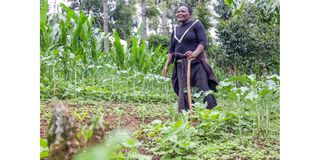Rural women, a nation’s powerful force

Jane Nyangenya on her farm in Bobaracho Nyaribari Chache in Kisii County. The mother of six practises mixed farming.
What you need to know:
- Despite often being excluded from decisions that affect their daily lives and despite being limited by unequal resource allocation, they are fundamental within and outside their households.
- They play an important role in ensuring the sustainability of rural households and communities, and do most of the unpaid work at home.
October is a special month for women and girls across the world. It is breast cancer awareness month; dedicated to raise awareness of the disease. Play your part accordingly.
On Wednesday, October 11, we marked International Day of the Girl Child. The day shines a spotlight on the unique challenges and opportunities girls face globally.
In an increasingly digital world, girls have the potential to harness technology for their empowerment. Access to education, information, and social networks online can be transformative, connecting them with mentors, access educational resources, and raise their voices on issues that matter to them.
However, the digital world poses new challenges. Online harassment, cyberbullying, and privacy concerns can affect girls’ safety and mental health. The day is also a call to action to end harmful practices like child marriage and female genital mutilation. Addressing these issues will ensure girls fulfil their potential.
Today, October 15, we observe the International Day of Rural Women. This day recognises rural women’s and girls’ crucial role in their communities, and calls for equal opportunities. Yet, this noble ideal is blurred by challenges and barriers these women, living outside big urban areas, encounter.
They face significant discrimination when it comes to land and livestock ownership, decision-making, access to resources, credit and markets.
Despite often being excluded from decisions that affect their daily lives and despite being limited by unequal resource allocation, they are fundamental within and outside their households. They play an important role in ensuring the sustainability of rural households and communities, and do most of the unpaid work at home.
Paid or not, they diligently undertake a wide range of duties. This silent majority form a significant portion of our population and play a crucial role in agricultural production, and maintaining rural economies.
The Food and Agriculture Organisation says women make up 43 per cent of the agricultural labour force in developing countries. This day is a call to action to address their challenges and create opportunities for them.
Governments, NGOs and international organisations should devise initiatives to improve rural women’s access to education, healthcare, water, and economic opportunities.
And in an increasingly digitalised world, access to technology and digital literacy can provide rural women with opportunities for education, employment, and entrepreneurship.
Mobile phones, for example, are a powerful tool for them to access information and engage in mobile banking. The government can play a crucial role in facilitating digital empowerment through policies that promote infrastructure development and affordability.
The intervention of state, civil society and county governments will break the status quo. The unpaid, unaccounted and underpaid contribution of rural women, not only in agriculture but the overall rural economy, must be counted. Policymakers, heed this call.
This day reminds us that a nation’s progress is intrinsically linked to its rural women’s empowerment. They hold key roles as producers, workers, processors, traders, retailers and consumers in their communities. Today, recognise rural women’s contributions and commit to empowering them in your capacity as an individual, organisation or government.





